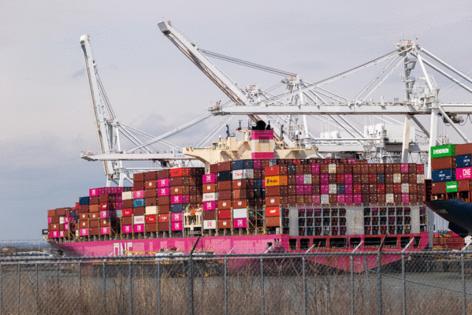Trump says US to impose 15% tariff on South Korean goods
Published in News & Features
SEOUL, South Korea — President Donald Trump said he reached a trade deal with South Korea that would impose a 15% tariff on its exports to the U.S. and see Seoul agree to $350 billion in US investments.
“We have agreed to a Tariff for South Korea of 15%. America will not be charged a Tariff,” Trump said in a post to his social media platform on Wednesday.
The investment fund Trump announced evokes a similar $550 billion account pledged by Japan in a successful bid to lower its threatened tariffs. As with the Japanese pledge, likened to a sovereign wealth fund, spending from the South Korean account on investments in the U.S. would be directed by Trump himself, the president said.
Trump also said South Korea had agreed to “accept American product including Cars and Trucks, Agriculture, etc.” That is likely to take the form of an agreement by Seoul to accept cars and trucks built to U.S. motor vehicle safety standards, without subjecting them to additional requirements.
It was not immediately clear if the agreement would guarantee discounted tariffs on automobiles and auto parts from South Korea — a key point of tension in recent negotiations between the countries.
South Korea will purchase $100 billion in liquefied natural gas or other energy products, Trump said. The pledge comes on top of a European Union promise to buy $750 billion of American energy over three years — and amid increasing questions about how the U.S. can fulfill the volumes being established in the country’s trade frameworks with other nations.
Trump has emphasized investments in the U.S. and purchase commitments — especially those tied to the nation’s oil and gas bounty — in reaching framework trade agreements.
The 15% tariff rate for South Korea is the culmination of months of talks and helps Seoul — the U.S.’s sixth-biggest trading partner — avert a 25% levy that was set to take effect Aug. 1, alongside fresh penalties for dozens of U.S. trading partners.
The negotiations were especially delicate for the young government in South Korea, as President Lee Jae Myung considered allowing the U.S. greater access to South Korea’s beef and rice markets — a politically sensitive topic that spurred widespread protests back in 2008.
Trump said the South Korean president would be visiting Washington within the next two weeks for a bilateral meeting.
Concessions by Lee risk torpedoing his honeymoon period in office by angering farmers and fracturing his party. His victory in June’s election after months of political turmoil prompted an uptick in sentiment among businesses and consumers and a surge in stocks to record levels.
But the nation was also playing catch-up in the trade talks to prevent higher universal tariffs damaging a fragile economy that’s just emerging from a contraction.
South Korea already has a free trade agreement with the U.S. and its corporate giants pledged tens of billions of dollars of investments as the trade talks were ongoing.
In the final weeks ahead of the U.S.-imposed Aug. 1 deadline, several Asian nations had been racing to lock in better terms. Japan’s deal set a new baseline of 15% — paired with an investment pledge, which Japanese officials later clarified is nearly all in the form of loans rather than cash. Indonesia and the Philippines each locked in a 19% rate, while Vietnam’s stands at 20%.
Thailand and Cambodia, which were engaged in border clashes, face 36% tariffs and were given further incentive to abide by a ceasefire when Trump said the U.S. wouldn’t relent on the higher levies while the two countries were in conflict.
_____
©2025 Bloomberg L.P. Visit bloomberg.com. Distributed by Tribune Content Agency, LLC.







Comments